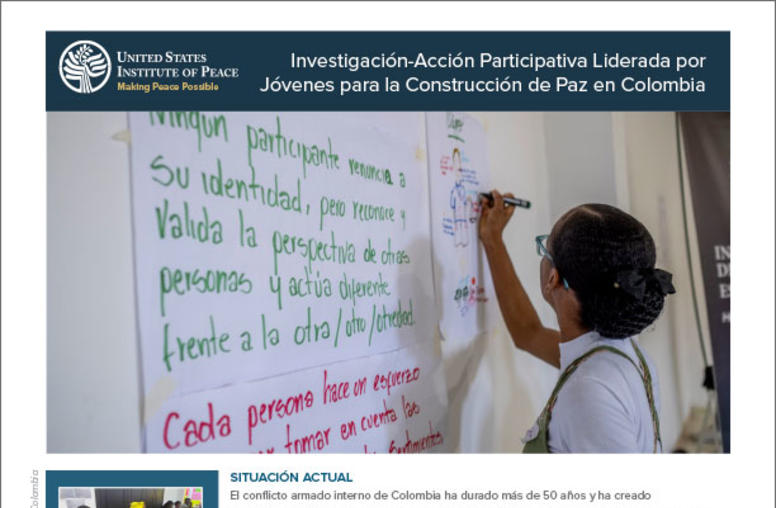![U.S. Secretary of State John Kerry shakes hands with Colombian peace negotiator Sergio Jaramillo Caro, who is accompanied by fellow negotiator Humberto De la Calle Lombana, before their breakfast meeting in Bogota, Colombia, on August 12, 2013. [State Department photo/ Public Domain]](/sites/default/files/styles/image_with_caption/public/20130813-SergioJaramillo_JohnKerry-DoS-tob.jpg?itok=gUST5uOT)
Topics that might require the U.S. to draw parameters, according to some of the participants, include drug policy, extradition, terrorist lists, transitional justice, and the U.S.-Colombia Free Trade Agreement. As an example, one question might be whether the U.S. would accept a peace accord that calls for limiting or ending aerial fumigation to kill crops cultivated for narcotics.
“It may be necessary for the United States ‘to swallow some toads’ for the sake of peace, and it is important to maintain flexibility and to give the Colombian parties the space to reach agreements,” according to a summary of the meeting prepared by Virginia M. Bouvier, USIP’s senior program officer for Latin America.
The May 29 event, the latest in USIP’s Colombia Peace Forum, gathered 30 scholars from throughout the Western Hemisphere to share insights on the impact of the peace process within Colombia and on the region, and to discuss U.S. policy options. USIP established the forum for policymakers, academics, and other specialists to discuss the peace process and help inform U.S. policy; USIP doesn’t take positions in U.S. government policy debates.
About 40 others attended the forum as well, including congressional staff and officials of the U.S. State Department, the U.S. Agency for International Development, the White House, the U.S. military’s Southern Command, the Inter-American Foundation, the World Bank, the Colombian Embassy, non-governmental organizations and other development agencies and groups.
The Colombia Peace Forum will continue its discussions this month as part of a Sept. 23-24 conference of USIP-supported scholars studying Colombia.
Adam Isacson, a senior associate for regional security policy at the nonprofit Washington Office on Latin America, told participants at the May forum that red lines might be necessary to ensure clarity on the U.S. stance. President Barack Obama, Vice President Joseph Biden, and more recently, Secretary of State John Kerry have visited Colombia and pledged support for the peace process. But implementation is bound to be fraught after five decades of conflict.
“The peace process might not succeed just because the United States supports it, but probably it would fail if the United States were to oppose it,” Isacson said during the forum.
The relationship between the two countries has become more and more balanced over the years, as the U.S. depends increasingly on Colombia to not only control drug trafficking to the north but also to train militaries and police forces throughout Latin America to cope with similar threats.
While negotiators in Colombia’s peace talks have reached agreement on land issues, they still have a long list of difficult agenda items to resolve: political participation, disarmament, illicit drugs, the rights of victims, and ratification and implementation of the peace plan.
“As Colombia’s High Commissioner for Peace Sergio Jaramillo has noted, `The signing of the agreement is the real start of the peace process, not the end,’ Bouvier wrote.
Prospects are promising for reaching a peace accord, she said. But increased violence, the absence of a ceasefire, limited information from the talks, and the lack of representatives of victims or civil society in the negotiations are fueling skepticism back in Colombia.
“The Defense Minister and some of the FARC leaders have assumed a hardline discourse aimed at their respective constituencies,” Bouvier wrote. “Former President Alvaro Uribe has provided a constant flow of criticism from his Twitter account. The use of inflammatory language also undermines public confidence. The Santos administration has been hard pressed to counter this rhetoric.”
Nazih Richani, a political science professor at Kean University in New Jersey and author of Systems of Violence: The Political Economy of War and Peace in Colombia, said the first five years after a peace accord is signed to end a civil war is the period when renewed violence is most likely to break out.
Michael Evans, director of the Colombia Project at the George Washington University’s National Security Archives, noted that all of the FARC negotiators have U.S. extradition orders pending. Would they be extradited despite a peace agreement in the same vein as were certain paramilitary leaders who demobilized? Might the U.S. remove the FARC from its terrorist lists?
As for the Free Trade Agreement, certain revisions might help support the peasant economy in Colombia, Richani said.
Bouvier’s report of the proceedings also emphasizes the need for more transparency in the peace talks to win public support, a comprehensive process that includes all insurgent groups, and an independent role for civil society groups to help implement and monitor any agreement.
Viola Gienger is a senior writer at USIP. Follow Virginia “Ginny” Bouvier’s personal blog, “Colombia Calls,” at http://vbouvier.wordpress.com.


